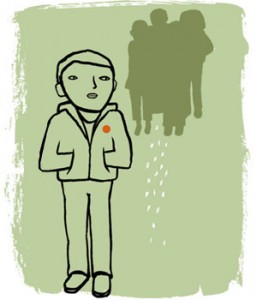Get out of the way and let the universe go about its business
Remember Carly Simon’s “You’re so vain, you probably think this song is about you”? Well, the way the self sees things, it was about you . . . we are an “it’s all about me” global culture. This pattern of behavior arises when the mind draws on impressions from the past to offer an unneeded reference point in order to interpret our experiences in the present.
We come into this world with a clean slate of innocence. Our memories are nonexistent and empty. We begin to form beliefs about the world around us almost immediately. The self becomes our own when, at around the age of four, we begin to develop an ego and a conscience. When the parental shouts, admonitions and shame based labels, which used to be outside us, suddenly begin to be acknowledged as our internal critical voice. We take ownership of those noises and the process of personalization has begun.“Quit Looking For Imaginary Issues”
As we evolve, every sensory experience we have gets stored as an impression on the psyche. Then some stuff that we didn’t experience, but think we did (snubs, injustices and other products of our imagination) gets stored as impressions as well. These impressions are stored in the filing cabinets of the brain as memory and used to form a self image of who we are.
These stored impressions are useful as coping vehicles in helping us to make sense of our world. These impressions are labeled and judged by the ego, while being internalized. Punishment from a parent easily gets labeled and impresses as “I am bad”. Every small nuance of life becomes emotional drama, and we are constantly accepting ownership about what is good or bad, ok or not ok, correct or incorrect. “It’s all about me”. Our finely tuned antennas scan our environment – constantly looking for ways to personalize everything. If it is raining outside, our self talk sounds like: “why did it have to rain on my parade”? If we spot a weed in the yard, “of all the yards, why do those weeds settle here”? Drug companies know this vulnerability well and use it to their advantage. All they have to do is run a new advertisement for a new drug for some obscure illness and doctors’ phones are flooded with people wanting appointments, certain they have contracted the new illness.
Whenever you personalize, you put distance between you and other humans and all of nature. You’re becoming separated from your natural state of being in harmony with everything and everybody. Harmony becomes an enemy; you strengthen your own separateness, and play right into the ego’s need for “me-ness”. The ego becomes addicted to personalization. Your focus becomes fixated on what is happening in your own particular life to the exclusion of seeing the larger picture. We fail to see life events and circumstances through the wisdom of the larger picture; the needy and greedy nature of the mind ensures disharmony surrounds the personalized “I”.
Many of us genuinely believe the delusion that other people cause our feelings. The idea that someone else made you feel anything is dysfunctional thinking. For example, let’s say you are walking along a familiar street . . . You see someone you know on the other side of the street . . . You smile and wave. The person makes no response . . . just doesn’t seem to notice you and walks right past without any sign of recognizing your existence.
If we’re feeling in a low mood that day, our self-talk word machine may tell us that the person deliberately ignored us and begin worrying that we’ve lost yet another friend. Our mind is likely to spin off, ruminating about what we did to upset the friend. Even if we had not been feeling very discontented at the start, this sort of self-talk can make us feel worse the longer it goes on. If the self-talk says we’ve been ignored, this may evoke anger. If it says we must have upset the person in some way, we may feel guilty. If it says we’ve probably lost a friend, we may feel lonely and sad.
The reality of the situation is likely to be that it has nothing to do with you, your friend was mentally fixated on some personal problem and their mind had shut down all sensory acuity in an attempt to focus on the problem du jour. So everything has the potential to cause emotional hurt. The mind, without editing, draws its own conclusion about every experience. This way of personalizing happenings in daily life leads to pain and suffering.
The mind can be retrained to stop personalizing external circumstances and experiences. We want the world to be all about us when we have not consciously realized the truth of who we are. This mental pattern never finds its conclusion. It is a way of thinking that must be seen for what it is and, in the awareness, it will drop automatically. Thus, it can be transcended, not resolved.
When we let go of personalizing our world, we’ll find a calmer non-judgmental mind with less stress. Rather than experiences happening to you that form judgmental impressions, you begin to allow them to simply happen. Your connection with experiences can be impersonal and not raise a response from you consciousness. You come to realize that “what is” is going to go about its business, without any editorializing from you. You will soon begin to notice order and a natural harmony to all things. All that is required is a shift in perspective through removing personal prejudice. Do not buy the idea that your experiences are all about you.
Personalizing is a prison . . . its solitary confinement.










